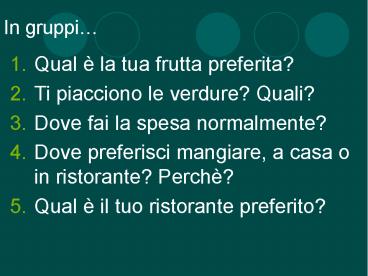In gruppi - PowerPoint PPT Presentation
Title:
In gruppi
Description:
In gruppi... Qual la tua frutta preferita? Ti piacciono le verdure? Quali? ... Used to describe actions that happened in the past. ... – PowerPoint PPT presentation
Number of Views:119
Avg rating:3.0/5.0
Title: In gruppi
1
In gruppi
- Qual è la tua frutta preferita?
- Ti piacciono le verdure? Quali?
- Dove fai la spesa normalmente?
- Dove preferisci mangiare, a casa o in ristorante?
Perchè? - Qual è il tuo ristorante preferito?
2
Il passato prossimo
3
Il passato prossimo
- Used to describe actions that happened in the
past. - Formed with the present tense of avere or essere
and the past participle of the verb. - I ate. Ho mangiato.
- I went. Sono andata.
4
Participio Passato
- -are ? -ato
- mangiare ? mangiato
- -ere ? -uto
- vendere ? venduto
- -ire ? -ito
- finire ? finito
There are several irregular past participles,
especially with the ere ending verbs. See p.
140 for list of the most common
5
- Giocare
- conjugate AVERE and add the Participio Passato of
the verb... - io ho giocato noi abbiamo giocato
- tu hai giocato voi avete giocato
- lei ha giocato loro hanno giocato
6
Avere, Essere -- Ripasso
- io ho noi abbiamo
- tu hai voi avete
- lei ha loro hanno
- io sono noi siamo
- tu sei voi siete
- lei è loro sono
7
When do we use avere?
- Avere is used with all transitive and many
intransitive verbs. - A transitive verb is a verb that has a direct
object complement. - A direct object is what receives the action of
the verb - It answers the question what or who
- I ate the cake. what did I eat? Cake, the
direct object - Ho comprato il pesce.
- Abbiamo mangiato ieri sera.
8
When do we use essere?
- Essere is used with many intransitive verbs.
- An intransitive verb cannot have a direct object
complement. - I was born.
- The question what or who did I born cant be
answered. - p. 140 La casa di Essere
- When using Essere the past participle AGREES with
the subject of the sentence in gender and number. - Io (Erica) sono nata in settembre.
- Noi siamo tornati.
9
Espressioni per il passato
- unora fa
- una settimana fa
- un anno fa
- la settimana scorsa
- sabato scorso
- lanno scorso
- già
- mai
10
Passato Prossimo
- Does the verb require essere or avere?
- What is the past participle of the verb?
- If the verb uses ESSERE then there must be
AGREEMENT between the past participle and the
suject.
11
io compro io esco noi ridiamo lei beve loro
stanno lui viene loro vanno lui parte voi
entrate tu torni tu fai io vedo io
prendo lei scende tu chiedi noi
assaggiamo io decido voi leggete lei
mangia noi arriviamo lui scrivi
12
Oggi compro il giornale. Ieri ho comprato il
giornale.
- mangio una mela
- incontro Giorgia
- vado al mercato
- sto a casa
- parto a mezzogirono
- Fabio
- Fabio e Gina
- io e Fabio
- tu
- tu e Fabio
13
- In gruppi
- rileggere Incontro p. 136
14
- PER CASA
- p. 141, A
- Rispondere alla domanda
- Cosa hai fatto ieri sera?
15
- Questa mattina Carolina 1. ___ (uscire) molto
presto. - 2. ___ (Andare) al mercato allaperto vicino a
casa sua. - Lì Carolina 3. ___ (comprare) frutta e verdura
fresche e 4. ___ (scegliere) un bel melone. - Purtroppo, 5. ___ (dimenticare) di comprare le
fragole. - 6. ___ (Prendere) il caffe ad un ber vicino al
mercato e poi 7. ___ (tornare) a casa.
16
Oggi... Ieri... Mirella esce con
Michele. Torno a casa alle 6.00. Voi non capite
la lezione. Finisci i compiti. Entriamo nel
negozio. Scrivo una lettera. Francesca fa una
torta. Siamo a Venezia. Pino e Michele lavorano
molto. Stefano e Lucia vanno al cinema. Bevo
molto caffè. Quando arrivate? Vediamo due
film. Luca e Marco prendono una pizza.
17
p. 142, D
- Sabato sera Massimiliano è uscito a ballare in
discoteca. Balla molto bene, e tutti i suoi
amici l'hanno guardato e hanno detto Che
forte!. Massimiliano è tornato a casa alle 2.30
di mattina, ha mangiato degli spaghetti freddi, e
poi è andato a letto.
18
1. Cosa hai mangiato ieri sera? 2. Cosa hai
comprato l'ultima volta che sei andata/o al
supermercato? 3. Sei mai stata/o in Italia? 4.
Hai mai visto un film italiano? 5. A che ora sei
arrivata/o all'università stamattina?































